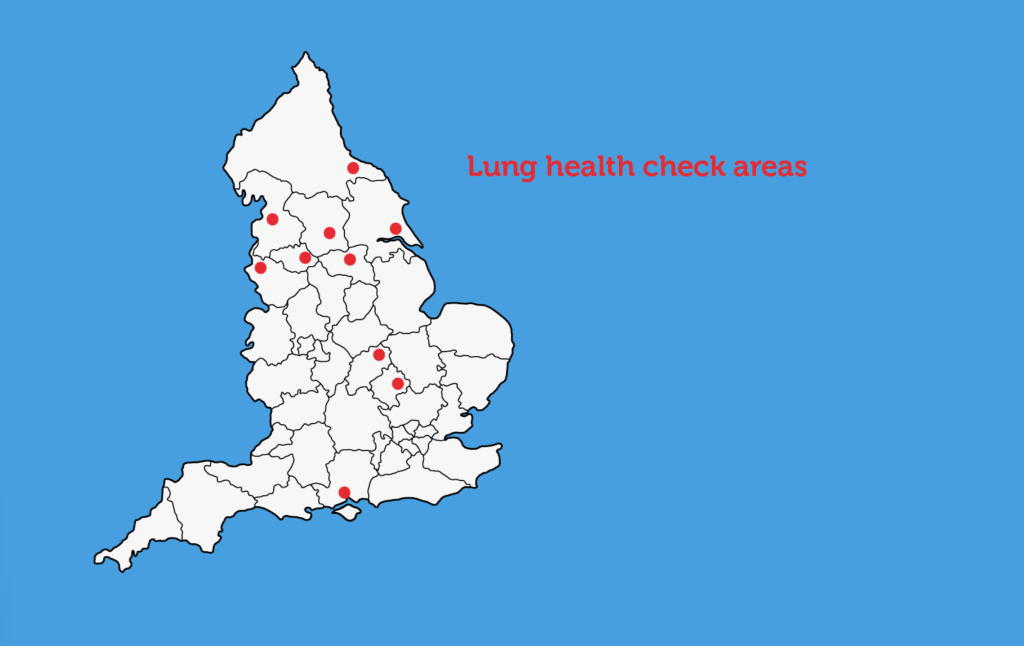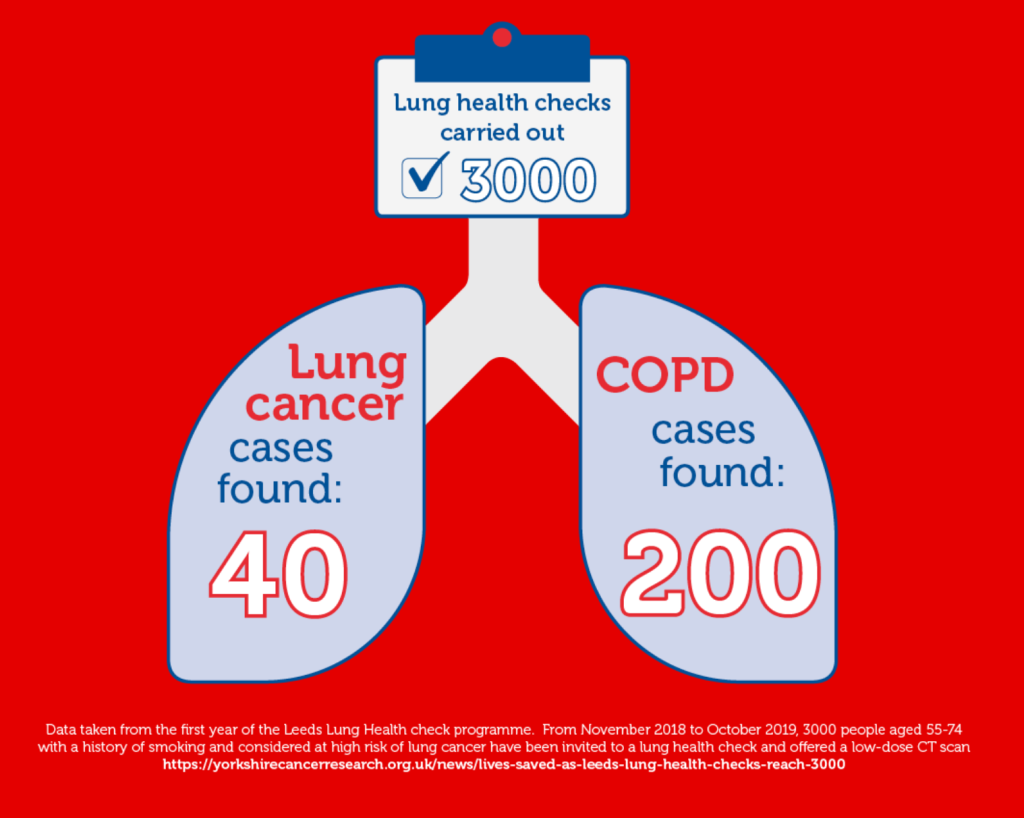One year on: identifying lung disease early
We made recommendations about improving the early and accurate diagnosis of lung disease. Here’s what’s happened in the last year.
Many people with a lung disease remain undiagnosed or misdiagnosed for years. The Taskforce has set up a diagnosis working group to drive forward the recommendations around diagnosis, including the adoption of an effective lung disease diagnosis pathway across the NHS.
“Our ambition must be to ensure respiratory symptoms and illnesses are taken as seriously as other adult physical health conditions such as diabetes and cardiovascular disease. Convening the Taskforce has enabled the breadth of voice to be heard so that a realistic set of objectives have been agreed that we can likely do something about. This coming together has been more successful than any previous attempts to unify the respiratory activist community so this is a real achievement and should not be underestimated.”
“A unified voice and clarity of purpose will be key to supporting NHS England to implement what the NHS Long Term Plan has asked of the respiratory community. Having worked within governmental bodies I know that resource and energy can wax and wane within a frequently shifting environment and having a critical friend like the Taskforce to help maintain focus and forward movement will be very helpful.
“We have agreed some clear objectives to improve early and accurate diagnosis and we must be focused now in achieving the ambition we have set ourselves.”
Co-chairs of the Taskforce for Lung Health diagnosis working group:
Dr Noel Baxter, GP, Primary Care Respiratory Society,
Carol Stonham, Registered Nurse, Primary Care Respiratory Society,
Dr Sam Hare, Consultant Chest Radiologist, Royal Free London NHS Foundation Trust and Royal College of Radiologists,
Dr Graham Robinson, Consultant Radiologist,
Royal United Hospitals Bath and British Society of Thoracic Imaging
Pathway for diagnosis
Recommendation 2a: Create a clear patient pathway with services for timely, accurate and complete diagnosis for all people with breathlessness and other respiratory symptoms.
NHS England has established a breathlessness working group to support the NHS Plan in recognition that breathlessness as a symptom is often overlooked in diagnosis and treatment.
The Taskforce has further developed its diagnostic pathway to use as a blueprint for NHS England. We want them to encourage local areas to set up diagnostic hubs to help diagnose respiratory and cardiovascular illnesses quickly and efficiently.
The Taskforce is also lobbying for data to be collected that shows how long it takes people with a respiratory condition to get a diagnosis, starting with when they first go to the doctor with symptoms.
“I’m angry that the health service missed so many opportunities to fully investigate what was wrong.”
Sarah, who lives with a lung condition

“The Taskforce is producing independent, multidisciplinary, best practice advice and aspirations. Without it there is risk that new guidelines in lung health are driven by inaccurate perceptions.
“To achieve a robust breathlessness gold-standard pathway, a proper pathway for pharmacists and clear guidance on lung screening would be big achievements.“
Dr Graham Robinson, Consultant Radiologist, Royal United Hospitals Bath

“The Taskforce for Lung Heath is an exciting collaboration of the largest-ever group of organisations and individuals who have come together to improve the nation’s lung health. Given the increasingly pivotal role of imaging in accurate and early diagnosis of lung disease, the Royal College of Radiologists (RCR) is in a unique position to help shape the NHS long-term vision for respiratory health. This refreshing, joined up approach, with the RCR privileged to be co-chairing the diagnosis workstream of the Taskforce recommendations, allows a united approach across organisations in order to deliver a uniquely consistent and transformative improvement in respiratory outcomes for patients.”
Dr Sam Hare, Consultant Chest Radiologist, Royal Free London NHS Trust
Community pharmacists
Recommendation 2b: Develop a formal referral system to enable community pharmacists to refer people directly to general practice or other appropriate organisations.
The NHS Plan envisages an expanded role for community pharmacists, working in partnership with GPs through primary care networks. Pharmacists will be supported to find and treat people with high-risk conditions, including lung conditions.
The Royal Pharmaceutical Society, a member of the Taskforce, has published a paper with the Royal College of GPs and the British Medical Association (BMA) calling for community pharmacists to have a greater role in early diagnosis of major conditions as part of primary care networks. We are encouraging NHS England to take this forward.
“Referral pathways should be clearly defined, so all health care professionals understand their roles and patients know what to expect.”
Single guideline for diagnosis and management of asthma
Recommendation 2c: Develop a single consistent guideline for diagnosis and management of asthma, including referral to tertiary services as appropriate for difficult or suspected severe asthma and ensure appropriate resources for implementation.
The British Thoracic Society, a member of the Taskforce, has been in discussions since 2017 with the National Institute for Health and Care Excellence (NICE) and the Scottish Intercollegiate Guidelines Network (SIGN) about the production of a joint guideline. Detailed technical discussions about process have taken place and we expect to hear more about the arrangements for the new guideline, which will be a joint activity, in December.
Lung cancer screening
Recommendation 2e: Implement a comprehensive national lung cancer screening programme, targeting those at high risk of developing lung cancer, and offering them low dose CT screening.
The NHS Plan made a commitment to extend and improve screening for lung disease to improve rates of early diagnosis
Ten areas will run pilot lung health checks aimed at diagnosing lung cancer at an early stage. The new projects will last initially for four years and NHS England will evaluate the results to use as a basis for further roll-out. Areas to receive funding are:
- North East and Cumbria Cancer Alliance – Newcastle Gateshead CCG
- Greater Manchester Cancer Alliance – Tameside and Glossop CCG
- Cheshire and Merseyside Cancer Alliance – Knowsley CCG and Halton CCG
- Lancashire and South Cumbria Cancer Alliance – Blackburn with Darwen CCG and Blackpool CCG
- West Yorkshire Cancer Alliance – North Kirklees CCG
- South Yorkshire Cancer Alliance – Doncaster CCG
- Humber, Coast and Vale Cancer Alliance – Hull CCG
- East of England Cancer Alliance – Thurrock CCG and Luton CCG
- East Midlands Cancer Alliance – Corby CCG and Mansfield and Ashfield CCG
- Wessex Cancer Alliance – Southampton CCG
The checks will be open to people aged between 55 and 74 with a history of smoking. They may be offered a spirometry test. Those at high risk of lung cancer will have an immediate low-dose CT scan.
People whose spirometry results suggest chronic obstructive pulmonary disease (COPD) will be referred to primary care for diagnosis and treatment.
The Taskforce is working closely with the cancer team at NHS England to ensure that those with suspected COPD receive immediate follow-up care. This should be given the same high priority as suspected lung cancer. All smokers should be offered smoking cessation support on the spot, so they reduce their chances of becoming ill in the future or improve their chances of successful treatment if they are diagnosed with a lung condition.
We are awaiting publication of the latest findings of the NELSON lung cancer screening trial – this is the biggest research programme to date looking at how effective lung screening is. This will help us to determine what the future of lung screening in England should be.


